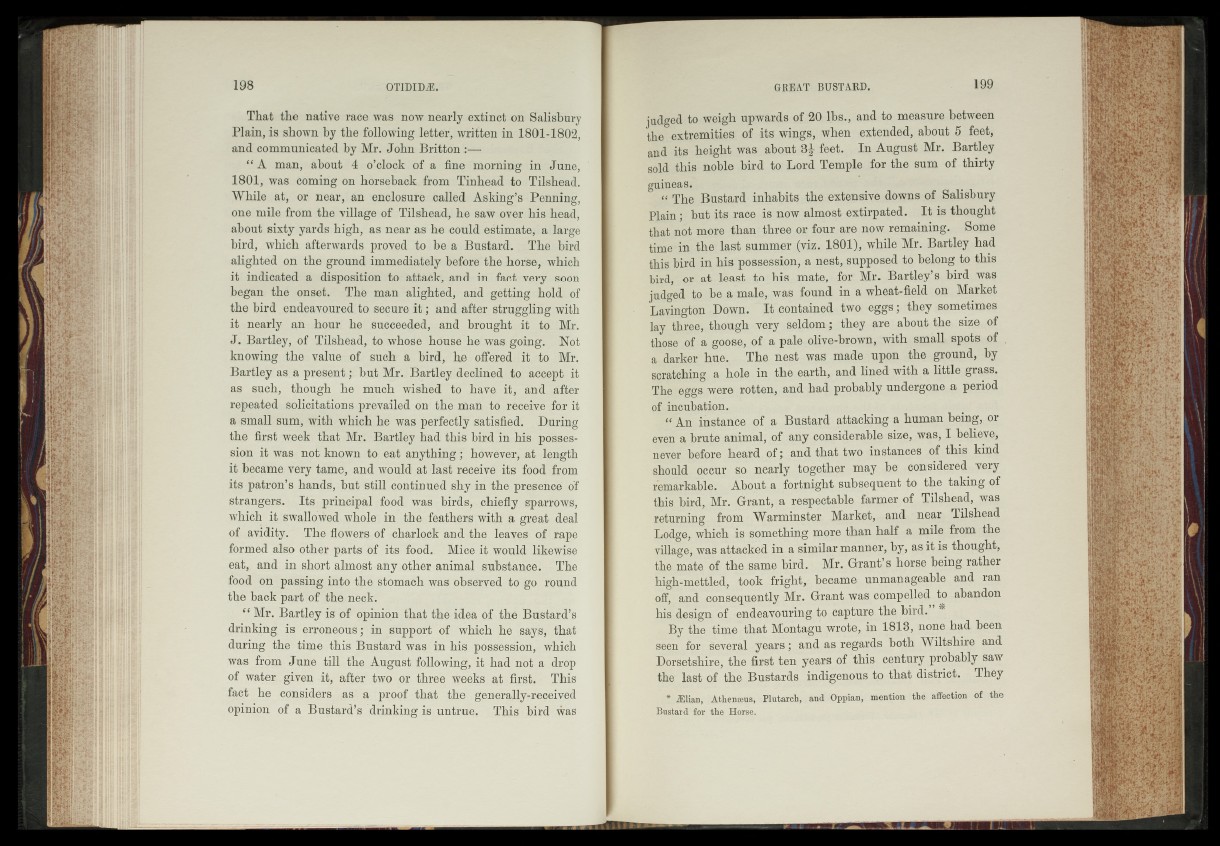
That the native race was now nearly extinct on Salisbury
Plain, is shown by the following letter, written in 1801-1802,
and communicated by Mr. John Britton I
“ A man, about 4 o’clock of a fine morning in June,
1801, was coming on horseback from Tinhead to Tilshead.
While at, or near, an enclosure called. Asking’s-Penning,
one mile from the village of Tilshead, he saw over his head,
about sixty yards high, as near as he could estimate, a large
bird, which afterwards proved' to be a Bustard. . The -bird
alighted on the ground immediately before the horse, which
it indicated a disposition to attack, and in fact very soon
began the onset. The man alighted, and getting hold of
the bird endeavoured.to secure it; and after struggling with
it nearly an hour he succeeded, and brought it to Mr.
J. Bartley, of Tilshead, to whose ihOuse he was going. Not
knowing the value..of such a bird, he offered it.;to Mr.
Bartley as a present ; but Mr. Bartley declined tin accept it
as such, though he much wished to have it, and after
repeated solicitations prevailed on' the man tô receive ior it
a small sum, with which- he wa.s perfectly satiôfiigdâ During
the first week that Mr." Bartley had this bijdjn his ;pn|&es-
sion it was not known to’ eat anything ; however, at length
it became very tame, and would at last receive its food from
its patron’s hands, but still continued shy in the;.presence o*f
strangers. Its principal food, was birds,, chiefly sparrows,
which it swallowed whole in the«feather«! ’with a grOgt- deal
of avidity. The flowers of - charlock and the leaves, of jrape
formed also other parts of itsTfood. ‘ Mice’it would; l|feej|§|;e
eat,, and in, short almost any .other animal substance. 'The
food on passing into-the stomach was observed to go round
the back part of ;the.neekj/ ',
“ Mr. Bartley is of opinion that the'i,dêa of the Bustard’s
drinking, is erroneous ; in support of which -he say&r, that
during the time .this Bustard was in his possession,, which
was from June till,, the August following, it had not a drop
of water given it, after two or three weeks at first. > This
fact he considers as" a ; proof that the generaJly?receiVed
opinion a Bustard’s drinking is .untrdê,. ' This bird was
judged to weigh upwards of 20 lbs., and to measure between
the extremities of its wings, when extended, about .5 feet,
and its height was about feet.. In August Mr. Bartley
sold this noble bird to Lord Temple for the sum of thirty
guineas. ' ,/r: .
“ The Bustard inhabits the extensive downs of Salisbury
Plain; but its race is now almost extirpated. It is thought
that not more than three or four are now,remaining. Some
time in the last summer .(viz,-1801), while Mr. Bartley had
this'bird in his possession, a nest, supposed to belong to;this
bird, or, at-least to his mate, for Mr. Bartley’s bird was
judged to bo a male, was found in a wheat-field on Market
Lavington Down. Itycontained two eggs; they sometimes
]ay three, though very seldom,; .they are about the size..of
those of a goose, of a pale olive-brown, with small spots pf .
a darker hup. , ,The. nest was made upon the ground, by
scratching a hole in the earth, and lined with a little grass.
The eggs were -rotten, ■ and had probably undergone a period
of incub.a|ion.
“ An instance of a Bustard attacking a human being, or
even a brute animal, of any considerable size, was, I .beja^vg^
never before heard of; and that two instances ,of-this kind
should ^ e n p so nearly ."together may h,er l considered very
remarkable. About a , fortnight subsequent to the taking of
this bird, Mr. Grant, a respectable farmer of Tilshead, was
returning from Warminster Market,r.and near. Tjlshead
Lodge, which is* (Something more than half a mile from the
village, was attacked in a similar manner ? by, as it is thought,
the mate of the same birch Mr. Grant’s horse being rather
highrmjttl^d, -took fright,- became unmanageable and ran
off, and consequently .Mr. Grant was impelled to abandon
his design o f »endeavouring tQ capture the>-hkdv % 5,
By the di^el that Montagu, wrote,. in‘;1813, none had been
seen for. sev.eral years; and as regards both j||p f|jhire and
^ se tsh ire , the firlf ten' years pf .'this. century .probably saw
the last of the Bustards indigenous t,o -that district. They
. * Mian, ^ithenseus, Plutarch, and Oppian, mention :the affection of the
Bustard for the Horse,